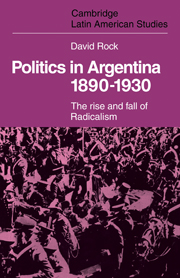Book contents
- Frontmatter
- Contents
- Preface
- 1 The components of Argentine society, 1890–1914
- 2 The oligarchy and institutional reform, 1880–1916
- 3 The rise of Radicalism, 1891–1916
- 4 The workers and their politics in Buenos Aires, 1890–1916
- 5 The first Radical government, 1916–22
- 6 The strikes, 1916–18
- 7 The Semana Trágica
- 8 1919
- 9 Postscript to the first presidency, 1920–2
- 10 The Alvear interlude, 1922–8
- 11 Yrigoyen's second presidency, 1928–30
- 12 Perspectives
- APPENDIXES
- 1 The occupational and class structure of the male population of the city of Buenos Aires by nationality, 1914
- 2 The rise of Radicalism – an historiographical note
- 3 The first Radical government and the Argentine Rural Society
- 4 The working class vote for the Radical and yrigoyenista parties in selected areas of Buenos Aires, 1912–30
- Select bibliography
- Index
4 - The workers and their politics in Buenos Aires, 1890–1916
Published online by Cambridge University Press: 04 August 2010
- Frontmatter
- Contents
- Preface
- 1 The components of Argentine society, 1890–1914
- 2 The oligarchy and institutional reform, 1880–1916
- 3 The rise of Radicalism, 1891–1916
- 4 The workers and their politics in Buenos Aires, 1890–1916
- 5 The first Radical government, 1916–22
- 6 The strikes, 1916–18
- 7 The Semana Trágica
- 8 1919
- 9 Postscript to the first presidency, 1920–2
- 10 The Alvear interlude, 1922–8
- 11 Yrigoyen's second presidency, 1928–30
- 12 Perspectives
- APPENDIXES
- 1 The occupational and class structure of the male population of the city of Buenos Aires by nationality, 1914
- 2 The rise of Radicalism – an historiographical note
- 3 The first Radical government and the Argentine Rural Society
- 4 The working class vote for the Radical and yrigoyenista parties in selected areas of Buenos Aires, 1912–30
- Select bibliography
- Index
Summary
The early history of the urban working class in Argentina is well documented at the level of the major events in which the workers took part, but there is very little systematic information on the development of working class social conditions. Partial or impressionistic data on wages, factory and housing conditions is readily accessible, but it has never been processed sufficiently to allow for any more than generalisations on the basic questions of workers' standards of living, or the manner in which standards of living evolved in terms of such variables as the economic cycle, immigration, foreign investment and overseas trade. The general picture emerging from this period is that while working class social conditions in Buenos Aires, particularly housing, left much to be desired, average wages compared well with many parts of Western Europe, and there were relatively better opportunities in Argentina for social mobility. On the other hand towards 1910, as the frontier disappeared and land became scarce, opportunities for the immigrants declined markedly. The other major factor to be borne in mind was the high level of aspirations among the immigrants, and the great premium they placed upon social mobility. Although social mobility did occur, there were many signs that it was insufficient to satisfy aspirations fully. One final point is that many of the immigrants were previously peasants, and a part of their behaviour in Buenos Aires may be attributed to the difficulties they encountered in assimilating into an urban capitalist culture.
- Type
- Chapter
- Information
- Politics in Argentina, 1890–1930The Rise and Fall of Radicalism, pp. 67 - 94Publisher: Cambridge University PressPrint publication year: 1975



